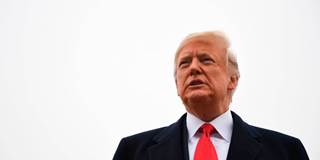If Trump’s iconoclastic style was merely a breach of traditional presidential etiquette, one might argue that his critics were being too fastidious, or were trapped in old-fashioned views of diplomacy. But crudeness can have consequences.
BEIJING – Time magazine did not choose Donald Trump as its Person of the Year in 2018, but it may do so this year. Trump ended last year facing criticism for announcing troop withdrawals from Syria and Afghanistan without consulting allies (resulting in the resignation of his respected defense secretary, James Mattis) and partially shutting down the government over a Mexican border wall. In 2019, with Democrats having taken over the House of Representatives, he will face increasing criticism of his foreign policy.
Administration supporters shrug off the critics. Foreign policy experts, diplomats, and allies are aghast at Trump’s iconoclastic style, but Trump’s base voted for change and welcomes the disruption. In addition, some experts argue that the disruption will be justified if the consequences prove beneficial for American interests, such as a more benign regime in Iran, denuclearization of North Korea, a change of Chinese economic policies, and a more evenly balanced international trade regime.
Of course, assessing the long-term consequences of Trump’s foreign policy now is like predicting the final score in the middle of a game. Stanford historian Niall Ferguson has argued that “the key to Trump’s presidency is that it is probably the last opportunity America has to stop or at least slow China’s ascendency. And while it may not be intellectually very satisfying, Trump’s approach to the problem, which is to assert US power in unpredictable and disruptive ways, may in fact be the only viable option left.”

BEIJING – Time magazine did not choose Donald Trump as its Person of the Year in 2018, but it may do so this year. Trump ended last year facing criticism for announcing troop withdrawals from Syria and Afghanistan without consulting allies (resulting in the resignation of his respected defense secretary, James Mattis) and partially shutting down the government over a Mexican border wall. In 2019, with Democrats having taken over the House of Representatives, he will face increasing criticism of his foreign policy.
Administration supporters shrug off the critics. Foreign policy experts, diplomats, and allies are aghast at Trump’s iconoclastic style, but Trump’s base voted for change and welcomes the disruption. In addition, some experts argue that the disruption will be justified if the consequences prove beneficial for American interests, such as a more benign regime in Iran, denuclearization of North Korea, a change of Chinese economic policies, and a more evenly balanced international trade regime.
Of course, assessing the long-term consequences of Trump’s foreign policy now is like predicting the final score in the middle of a game. Stanford historian Niall Ferguson has argued that “the key to Trump’s presidency is that it is probably the last opportunity America has to stop or at least slow China’s ascendency. And while it may not be intellectually very satisfying, Trump’s approach to the problem, which is to assert US power in unpredictable and disruptive ways, may in fact be the only viable option left.”